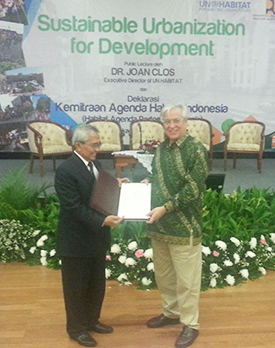Friday, 20 June 2014

Building inclusive, safe and sustainable cities and human settlements is a key challenge for Indonesia and many other rapidly developing countries. With this aim in mind, the Ministry of Public Works has invited the Executive Director of UN-Habitat for a two day official mission to Jakarta and Surabaya. Dr. Clos’ main message is for Indonesia to enhance the capacities of governments for integrated urban and territorial planning, so that more people and businesses can thrive in liveable cities.
The mission to Indonesia coincides with the early preparations for Habitat III, the Third United Nations Conference for Sustainable Urban Development and Housing which will be held in 2016. This will be the first global UN conference after the conclusion of the Post-2015 Development Agenda.
“Urbanization is not a passive outcome of development but a source of development,” says Dr. Clos. “Therefore, it is crucial that the post-2015 Development Agenda addresses the challenge of how cities and towns can be better planned and managed, and fulfill their role as drivers of sustainable development.”
Dr. Clos is welcoming Indonesia to champion the promotion of the New Urban Agenda nationally and in the Asia-Pacific region by taking the regional lead in the preparations of Habitat III and the promotion of inclusive and sustainable urban development.
Dr. Clos was invited by the Ministry, which supports neighbourhood improvements and citywide infrastructure development. UN-Habitat recognizes that Indonesia has developed remarkable national community empowerment programmes, put participation in many laws for city development and has seen local authorities and mayors come up capable of taking urban development together with urban communities forward. In this context, the Ministry’s aim for 0% slums in Indonesia by 2019 is now becoming a viable target. However, bridging innovative spatial planning and participatory development planning for cities and urbanizing regions is still very challenging.
This convinced the Ministry to seek more collaboration with UN-Habitat in the following years and to use Habitat III preparations as an opportunity to work with partners – urban community groups, local governments, academics, and businesses – to spell out Indonesia’s new urban agenda and policies.
The Minister of Public Works, Dr. Djoko Kirmanto, reminds that Indonesia is supporting the proposed sustainable development goal of sustainable cities and human settlements in the United Nations and expresses the hope that the collaboration with UN-Habitat not only enhances Indonesia’s regional voice but also helps young professionals and planners to learn through regional collaboration.
Dr. Joan Clos, Under-Secretary-General of the United Nations and Executive Director of UN-Habitat arrived in Jakarta on Thursday, June 19 for the two day visit. He is scheduled to meet with the Vice-President of Indonesia, Prof. Dr. Boediono, sign agreements with the Ministry of Public Works, address a gathering of stakeholders in Jakarta on the “Key Role of Sustainable Urbanisation for Development” and visit the Green Kampung Programme in Surabaya. He will conclude his visit to Indonesia speaking about "Urban Streets and Public Spaces as Drivers of Urban Prosperity" in at Surabaya’s city hall.
Dr. Clos was mayor of Barcelona for 10 years, before serving as a minister in the Spanish Government and, in 2010, became Executive Director of the United Nations Human Settlements Programme. Indonesia has supported UN-Habitat since its creation as a UN agency in 1977. Equally, UN-Habitat has provided grant support to Indonesia over the last 20 years to the amount of IDR 756 billion at today’s exchange rate, to support housing and reconstruction in more than 10 cities, in collaboration with several government agencies.
Annex
KEY ROLE OF SUSTAINABLE URBANIZATION FOR DEVELOPMENT Dr. Joan Clos, Executive Director, UN-Habitat
Urbanization is accelerating and has the potential to be the major driver of sustainable development in the next thirty years. However, without well-planned and managed urbanization, sustainable development will not be possible. Urbanization is not a passive outcome of development but a source of development. Therefore, it is crucial that the post-2015 Development Agenda addresses the challenge of how cities and towns can become better planned and managed, and fulfill their role as drivers of sustainable development.
We must recognize that good urbanization based on positive efficiencies does not come by chance. It comes by design. Good planning and design should establish minimum densities, optimise street connectivity and social diversity. And it should aspire to an urban fabric that blends housing varieties, walkable urban spaces and varied transportation options. In fact, proper urban planning and design is a precondition for urbanization.
Habitat III will be the first UN global summit following the adoption of the Post-2015 development goals and, hopefully, a new climate agreement at COP21 in Paris. Habitat III, to be held in 2016, will be a tremendous opportunity for member states, mayors and partners worldwide to drive sustainable development. It will agree on a ‘new urban agenda’ that represents a paradigm shift towards a new model of urbanization, to better respond to the challenges of our age, optimizing resources to harness future potentials.







